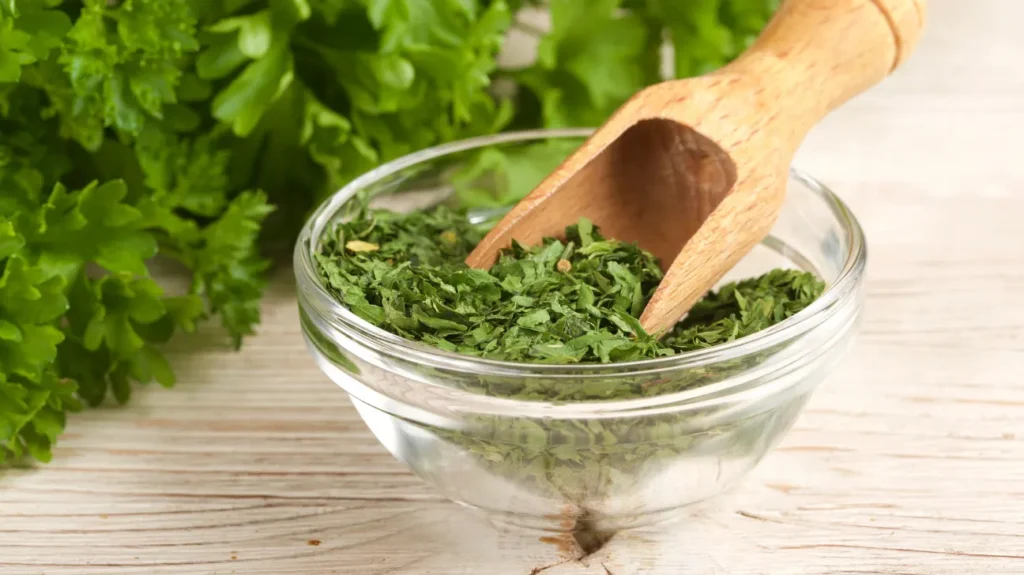Parsley Piert (Aphanes arvensis), a small herbaceous plant, has been used for centuries in traditional medicine, particularly for its diuretic properties. Recent interest in herbal remedies has led to Parsley Piert being investigated for its nootropic potential—that is, its ability to enhance cognitive functions such as memory, learning, and concentration. Although it is more commonly associated with kidney and bladder health, Parsley Piert contains bioactive compounds that may contribute to brain health, making it a candidate for use as a nootropic supplement. This article explores the origins, chemistry, physiological mechanisms, dosage, side effects, interactions, and risks of Parsley Piert as a nootropic, offering comprehensive insights into its safe use.
You May Aslo Like:
Tung Seed: Benefits, Dosage, Side Effects, Drug Interactions, and Other Important Information
Cananga Oil: Benefits, Dosage, Side Effects, Drug Interactions, and Other Important Information
Sources of Parsley Piert
Parsley Piert is native to Europe and North Africa, where it thrives in meadows, pastures, and grasslands. It has since spread to other parts of the world, including North America. Traditionally, the aerial parts of the plant are used for medicinal purposes, either as a tea or dried powder. The herb is often confused with parsley due to its name but belongs to the rose family (Rosaceae) rather than the carrot family (Apiaceae), to which parsley belongs.
The bioactive compounds in Parsley Piert include tannins, flavonoids, and triterpenes, which are thought to contribute to its medicinal properties. These compounds have been studied for their antioxidant, anti-inflammatory, and diuretic effects, all of which could support the brain and body in various ways. While it has been used primarily for urinary tract and kidney-related ailments, the herb’s broader range of effects is now under investigation, including its impact on cognitive function.
Support Body Wellness and Brain Function with Parsley Piert—Order Now on Amazon!

Chemistry of Parsley Piert
The active compounds in Parsley Piert include:
- Tannins: A group of polyphenols known for their astringent properties, tannins in Parsley Piert are thought to contribute to its diuretic and anti-inflammatory actions. Tannins can bind to proteins and other organic compounds, potentially protecting brain cells from oxidative damage.
- Flavonoids: Compounds like quercetin and kaempferol are present in Parsley Piert. These flavonoids are known for their antioxidant and anti-inflammatory properties, which could play a neuroprotective role in the brain by neutralizing harmful free radicals and reducing inflammation that may contribute to cognitive decline.
- Triterpenes: These compounds, including ursolic acid, have been shown to have anti-inflammatory, antioxidant, and neuroprotective effects, contributing to overall brain health and possibly enhancing cognitive function.
These compounds work synergistically to reduce oxidative stress, support healthy circulation, and protect neurons from damage, making Parsley Piert a potential candidate for nootropic use.

Physiological Mechanisms of Parsley Piert in the Body and Brain
Parsley Piert’s potential as a nootropic stems from its ability to protect the brain from oxidative stress and inflammation. The brain is particularly susceptible to oxidative damage due to its high oxygen consumption, and chronic oxidative stress has been linked to neurodegenerative diseases such as Alzheimer’s and Parkinson’s.
- Antioxidant Effects: The flavonoids in Parsley Piert neutralize reactive oxygen species (ROS), which can cause cellular damage and accelerate cognitive decline. By reducing oxidative stress in the brain, Parsley Piert may help preserve cognitive function as we age.
- Anti-inflammatory Action: Inflammation in the brain, often triggered by chronic diseases or injury, is a major contributor to cognitive impairment. The triterpenes and flavonoids in Parsley Piert may modulate the production of pro-inflammatory cytokines, helping to protect neurons from damage caused by chronic inflammation.
- Circulatory Support: Parsley Piert’s mild diuretic properties may improve circulation, including cerebral circulation. Enhanced blood flow to the brain ensures a steady supply of oxygen and nutrients, which is critical for maintaining cognitive performance, particularly in high-demand situations like learning and memory tasks.
Parsley Piert for Complete Body and Brain Wellness—Shop Amazon’s Best Supplements Now!

Nootropic Benefits of Parsley Piert
The nootropic benefits of Parsley Piert are not as well-established as those of other popular supplements, such as ginkgo biloba or bacopa monnieri. However, preliminary studies and anecdotal evidence suggest several potential cognitive benefits:
- Improved Memory and Learning: The antioxidant and anti-inflammatory properties of Parsley Piert may help protect brain cells from damage, supporting the retention and recall of information. By reducing oxidative stress, the herb may enhance synaptic plasticity—the brain’s ability to adapt and form new neural connections, which is critical for learning.
- Enhanced Mental Clarity and Focus: By promoting better circulation and reducing inflammation, Parsley Piert may enhance cognitive clarity and focus. This could be particularly beneficial during periods of mental fatigue, where the brain’s energy demands are heightened.
- Neuroprotective Effects: The flavonoids and triterpenes in Parsley Piert offer neuroprotection by mitigating oxidative damage and inflammation, potentially slowing down age-related cognitive decline and protecting against neurodegenerative conditions.
- Stress Reduction and Anxiety Management: The anti-inflammatory and antioxidant properties of Parsley Piert may help regulate the body’s stress response. Chronic stress can impair cognitive function and lead to anxiety. By reducing inflammation and oxidative stress, Parsley Piert may support a balanced mood and reduce feelings of anxiety, which can indirectly improve cognitive performance by promoting a calmer, more focused mental state.
- Improved Sleep Quality: Parsley Piert’s diuretic properties may help promote better sleep by supporting the removal of toxins from the body, which can enhance relaxation and reduce discomfort that may interfere with restful sleep. Better sleep quality is closely linked to improved cognitive function, including memory consolidation, learning, and overall mental performance.
- Support for Mental Fatigue: Parsley Piert may help alleviate mental fatigue by enhancing cerebral blood flow and reducing oxidative stress in the brain. During periods of intense mental work, the brain’s demand for energy increases, and by promoting circulation and reducing inflammation, Parsley Piert could help sustain mental stamina, particularly in situations requiring prolonged concentration and focus.
- Cognitive Flexibility: Cognitive flexibility, the brain’s ability to switch between tasks and think about multiple concepts simultaneously, may be supported by the neuroprotective effects of Parsley Piert. The herb’s role in reducing inflammation and oxidative stress may preserve the integrity of neural pathways involved in multitasking and adaptive thinking, which are key components of cognitive flexibility.

Dosage and Supplementation Guidelines
While there is no established recommended dosage for Parsley Piert as a nootropic, traditional usage and herbal medicine guidelines offer some insights. Most nootropic supplements are taken in doses that range from small, preventive amounts to larger therapeutic doses, depending on the individual’s needs.
- General Nootropic Dosage: For general cognitive enhancement, a dosage of 500 mg to 1,000 mg of dried Parsley Piert powder per day, taken in divided doses, is a reasonable starting point. Extracts standardized to contain specific concentrations of flavonoids or tannins may require smaller doses, typically ranging from 50 mg to 200 mg per day, depending on the concentration.
- Supplement Forms: Parsley Piert is available as a dried powder, in capsules, and as liquid extracts. The liquid extract form offers fast absorption, while capsules and powders may be more convenient for consistent dosing.
It is essential to consult a healthcare provider before starting Parsley Piert supplementation, especially for individuals with underlying health conditions or those already taking medications or other supplements.
Support Whole-Body Health and Cognitive Clarity with Parsley Piert—Order Now from Amazon!

Side Effects and Safety
Parsley Piert is generally considered safe when used in moderate amounts, but like any supplement, it can cause side effects in some individuals, particularly at higher doses. Common side effects include:
- Digestive Upset: Mild nausea, stomach cramps, or diarrhea may occur in some individuals, especially when first starting supplementation.
- Electrolyte Imbalance: Due to its diuretic effects, Parsley Piert may cause an imbalance in electrolytes such as potassium and sodium, leading to symptoms like fatigue, weakness, or muscle cramps if taken in excessive amounts.
- Allergic Reactions: Though rare, allergic reactions such as rashes or itching may occur in individuals who are sensitive to plants in the rose family. Individuals with known plant allergies should proceed with caution.
Interactions with Other Supplements and Medications
As a herbal supplement, Parsley Piert can interact with other supplements and medications, potentially leading to adverse effects or reduced efficacy.
- Diuretics: Since Parsley Piert has diuretic properties, combining it with other diuretic supplements or medications (e.g., furosemide or hydrochlorothiazide) can increase the risk of dehydration or electrolyte imbalances. Monitoring fluid and electrolyte levels is important when combining diuretics.
- Blood Thinners: The flavonoids in Parsley Piert may have mild blood-thinning effects, which could interact with anticoagulant medications like warfarin or aspirin. Combining Parsley Piert with these medications could increase the risk of bleeding.
- Anti-inflammatory Drugs: Given its anti-inflammatory properties, Parsley Piert may enhance the effects of nonsteroidal anti-inflammatory drugs (NSAIDs), such as ibuprofen. This could be beneficial in some cases but may also increase the risk of gastrointestinal side effects or kidney stress.
- Other Nootropics: Parsley Piert can be safely combined with other nootropics, such as ginkgo biloba or rhodiola rosea, to enhance cognitive function. However, combining multiple supplements that affect blood flow or brain activity should be done under the guidance of a healthcare provider to avoid overstimulation.
Risks for Individuals with Certain Health Conditions
While Parsley Piert is generally safe, individuals with specific health conditions should exercise caution:
- Kidney Disease: Parsley Piert’s diuretic effects may place additional strain on the kidneys, particularly in individuals with pre-existing kidney conditions. High doses may exacerbate kidney function impairment.
- Low Blood Pressure: Since Parsley Piert may help reduce blood pressure by promoting diuresis and circulation, individuals with already low blood pressure may experience dizziness or fainting if they take this supplement in excessive amounts.
- Electrolyte Disorders: Those with existing electrolyte imbalances or conditions like Addison’s disease should avoid Parsley Piert due to its potential to exacerbate electrolyte disturbances.
Promote Physical Health and Cognitive Wellness with Parsley Piert—Buy Today on Amazon!

Conclusion: Should You Consider Parsley Piert as a Nootropic?
While research into Parsley Piert as a nootropic is still in its infancy, the herb’s antioxidant, anti-inflammatory, and circulatory benefits suggest it may offer cognitive enhancement, particularly for individuals seeking to improve memory, focus, and mental clarity. However, like any supplement, it should be used responsibly and under the guidance of a healthcare provider, particularly when combined with other supplements or medications.
Parsley Piert holds promise as a gentle, natural cognitive enhancer, though more research is needed to fully validate its efficacy in this area. In the meantime, individuals looking to support brain health may find it to be a useful part of a broader nootropic strategy, particularly when combined with a healthy lifestyle and other brain-boosting supplements.

References:
- Parsley Piert. Retrieved from: https://www.rxlist.com/supplements/parsley_piert.htm
- Antioxidant and Cytotoxic Activities of Aphanes arvensis Extracts. Retrieved from: https://www.researchgate.net/publication/226926836_Antioxidant_and_Cytotoxic_Activities_of_Aphanes_arvensis_Extracts
- Aphanes arvensis – L. Retrieved from: https://pfaf.org/user/Plant.aspx?LatinName=Aphanes+arvensis
Important Note: The information contained in this article is for general informational purposes only, and should not be construed as health or medical advice, nor is it intended to diagnose, prevent, treat, or cure any disease or health condition. Before embarking on any diet, fitness regimen, or program of nutritional supplementation, it is advisable to consult your healthcare professional in order to determine its safety and probable efficacy in terms of your individual state of health.
Regarding Nutritional Supplements Or Other Non-Prescription Health Products: If any nutritional supplements or other non-prescription health products are mentioned in the foregoing article, any claims or statements made about them have not been evaluated by the U.S. Food and Drug Administration, and such nutritional supplements or other health products are not intended to diagnose, treat, cure, or prevent any disease.


